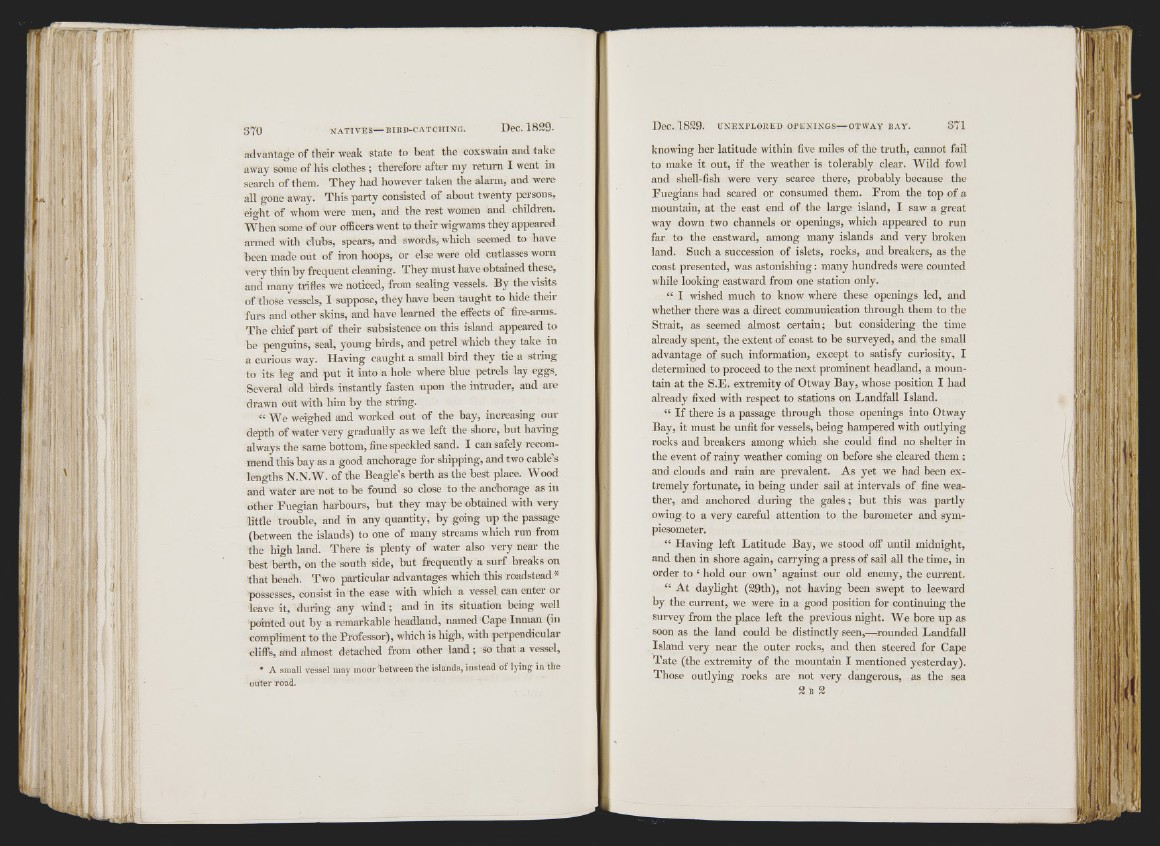
\ I
1 :
1 :
! i.
v , l h I
advantage of their weak state to beat the coxswain and take
away some of his clothes ; therefore after my return I went in
search of them. They had however taken the alarm, and were
all gone away. This party consisted of about twenty persons,
eight of whom were men, and the rest women and children.
AVhen some of our officers went to their wigwams they appeared
armed with clubs, spears, and swords, which seemed to have
heen made out of iron hoops, or else were old cutlasses worn
very thin by frequent cleaning. They must have obtained these,
and many trifles we noticed, from sealing vessels. By the visits
of those vessels, I suppose, they have been taught to hide their
furs and other skins, and have learned the effects of fire-arms.
The chief part of their subsistence on this island appeared to
he penguins, seal, young birds, and petrel which they take in
a curious way. Having caught a small bird they tie a string
to its leg and put it into a hole where blue petrels lay eggs.
Several old birds instantly fasten upon the intruder, and are
drawn out with him by the string.
“ We weighed and worked out of the bay, increasing our
depth of water very gradually as we left the shore, but having
always the same bottom, fine speckled sand. I can safely recommend
this bay as a good anchorage for shipping, and two cable’s
lengths N.N.W. of the Beagle’s berth as the best place. Wood
and water are not to be found so close to the anchorage as in
other Fuegian harbours, but they may be obtained with very
little trouble, and in any quantity, by going up the passage
(between the islands) to one of many streams which run from
the high land. There is plenty of water also very near the
best berth, on the south side, but frequently a surf breaks on
that beach. Two particular advantages which this roadstead*
possesses, consist in the ease with which a vessel can enter or
leave it, during any wind; and in its situation being well
pointed out by a remarkable headland, named Cape Inman (in
compliment to the Professor), which is high, with perpendicular
cliffs, and almost detached from other land ; so that a vessel,
• A small vessel may moor between the islands, instead of lying in tiie
outer road.
knowing her latitude within five miles of the truth, cannot fail
to make it out, if the weather is tolerably clear. Wild fowl
and shell-fish were very scarce there, probably because the
Fuegians had scared or consumed them. From the top of a
mountain, at the east end of the large island, I saw a great
way down two channels or openings, which appeared to run
far to the eastward, among many islands and very broken
land. Such a succession of islets, rocks, and breakers, as the
coast presented, was astonishing; many hundreds were counted
wliile looking eastward from one station only.
“ I wished much to know where these openings led, and
whether there was a direct communication through them to the
Strait, as seemed almost certain; but considering the time
already spent, the extent of coast to be surveyed, and the small
advantage of such information, except to satisfy curiosity, I
determined to proceed to the next prominent headland, a mountain
at the S.E. extremity of Otway Bay, whose position I had
already fixed with respect to stations on Landfall Island.
“ I f there is a passage through those openings into Otway
Bay, it must be unfit for vessels, being hampered with outlying
rocks and breakers among which she could find no shelter in
the event of rainy weather coming on before she cleared them ;
and clouds and rain are prevalent. As yet we had been extremely
fortunate, in being under sail at intervals of fine weather,
and anchored during the gales; but this was partly
owing to a very careful attention to the barometer and syin-
piesometer.
“ Having left Latitude Bay, we stood off until midnight,
and then in shore again, carrying a press of sail all the time, in
order to ‘ hold our own’ against our old enemy, the current.
“ At dayhght (29th), not having been swept to leeward
by the current, we were in a good position for continuing the
survey from the place left the previous night. We bore up as
soon as the land could be distinctly seen,—rounded Landfall
Island very near the outer rocks, and then steered for Cape
Tate (the extremity of the mountain I mentioned yesterday).
Those outlying rocks are not very dangerous, as the sea
2 b 2
I
'I!?I
l l